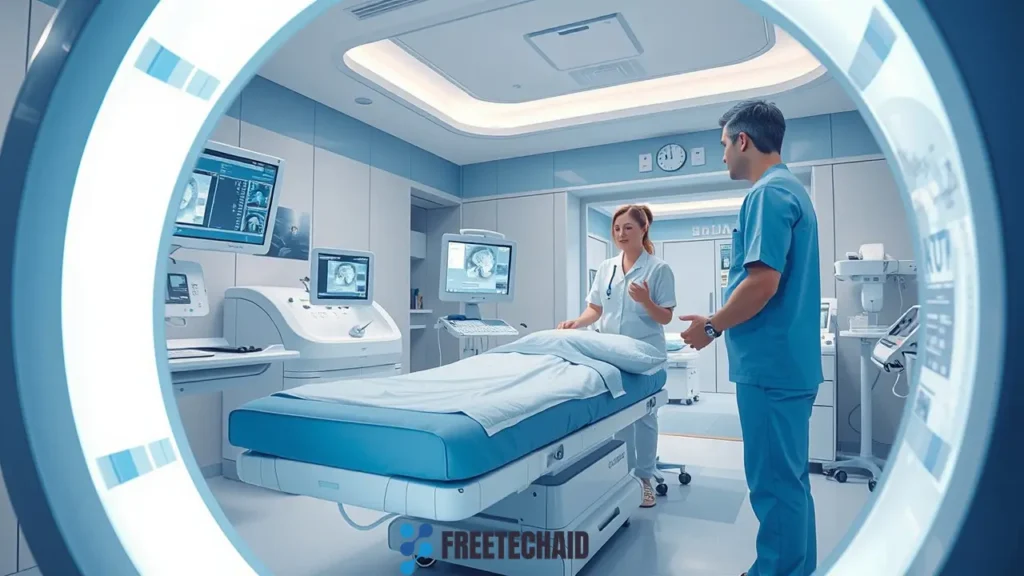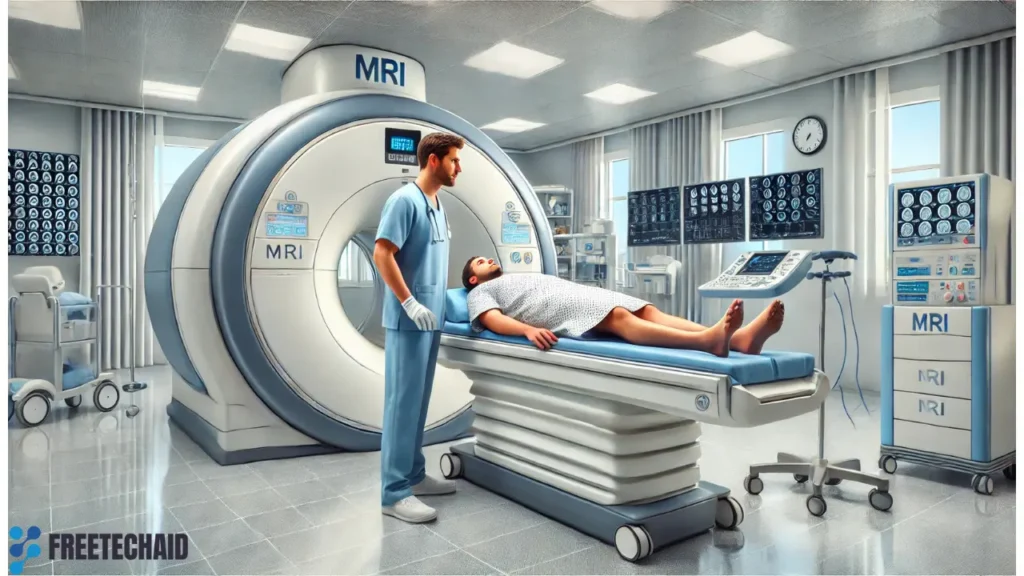Introduction
In this fast-paced and ever-changing world of health care and an increasingly crowded medical industry, the role of the MRI technologist is more crucial than ever. They are the core of modern diagnostic imaging technologies and play a crucial function in determining different health issues. What exactly is required to be an MRI technologist? Is this the job that may be the right choice for you?
MRI tech utilize electromagnetic resonance (MRI) scanners to generate high-quality images of the interior of our bodies. They aid in diagnosing all kinds of injuries and ailments, offering crucial insight into the condition of patients. If you’re considering an occupation in MRI technology, it is an area with promising career prospects, competitive wages, and a significant influence on the lives of others.
What Does an MRI Technologist Do?

Primary Responsibilities
An MRI technologist’s primary job is to operate MRI equipment to collect images of the internal structures within patients. Doctors utilize images to identify and treat diseases such as muscle tears, tumours, and brain diseases. The MRI technician prepares patients before the procedure. He tells them what to expect and assures them they’re comfortable during the examination.
Role in Diagnosing Medical Conditions
MRI scans offer exact pictures of soft tissues crucial for diagnosing various health problems that X-rays and CT scans may not be able to detect. From diagnosing cancer to checking for issues with the spine, MRI technologists play a vital role in helping doctors determine the cause of a patient’s symptoms.
Interaction with patients
The interaction with the patient is an essential component of the work. MRI technologists must ensure that patients are physically ready to undergo the procedure and alleviate fears. Because MRI machines are often difficult to navigate, their job is to create confidence and trust by communicating clearly with their patients, ensuring they feel at ease and are aware of the procedure.
Skills Required to Become an MRI expert
Technical Skills
An MRI technologist demands a thorough knowledge of how MRI equipment works. It is a prerequisite for knowing the correct way to place patients’ operate the scanner, and modify settings so that you can capture excellent images. Technologists also need to be conversant with safety procedures to minimize hazards associated with the massive magnetic fields utilized to create MRI technology.
Interpersonal Skills
Because MRI technologists often interact with patients, excellent interpersonal skills are vital. Technologists should be able to speak effectively, soothe anxious patients, and maintain a professional and compassionate manner.
Analytical Skills
The process of analyzing MRI images is equally important. Technologists need to evaluate their pictures for clarity and precision prior to sending images to a physician. They need to pay attention to particulars to ensure that no detail is missed when it scans.
Educational Requirements for MRI expert
Basic Educational Path
You usually require an associate’s certificate in radiologic technologies or related fields to be an MRI technologist. This course will instruct you on the basic anatomy of the treatment of patients, as well as medical imaging. Some schools offer specialization in MRI technology.
Certification and Licensing
In most States, MRI technologists must be certified to work, and obtaining certification from the American Registry of Radiologic Technologists (ARRT) is essential. The ARRT provides certification for MRI technology. It requires passing an exam to test your knowledge of MRI methods and their safety.
Advanced Degrees and Specializations
Although an associate’s degree is the standard requirement, many MRI technologists seek further studies to focus on specific fields or advance their careers. In particular, technologists may concentrate on specific areas, such as neuroimaging or musculoskeletal. Some professionals even pursue a bachelor’s or master’s degree in radiologic sciences, which could open doors to take on leadership positions.
MRI expert Job Outlook and Demand
Growing Demand in the Healthcare Industry
The need for MRI technologists is anticipated to increase steadily due to an ageing populace that needs increased diagnostic imaging. Since more and more patients seek medical treatment for chronic diseases and conditions, the demand for MRI services is expected to continue growing.
Job Opportunities in Different Settings
MRI technologists can work in different environments, such as outpatient clinics, hospitals, research institutes, and even mobile imaging equipment. This career choice lets professionals choose the right environment for their personal preferences.
How to Become an MRI expert?
Step-by-Step Guide to Starting Your Career
- Get a degree: Begin by earning an associate’s diploma in radiologic technology.
- Learn to be Certified: Following completion, you can seek certification through the ARRT.
- Get a Job: Search for jobs in the entry-level position at the clinics or hospitals.
- Learn from Experience: Participate in various healthcare environments to get hands-on experience.
Choosing the Right School or Program
When selecting a school, ensure it’s approved by a recognized organization such as The American Registry of Radiologic Technologists. Accreditation assures you that the school adheres to industry standards and prepares the student for certification.
Gaining Hands-On Experience
Many MRI technician programs require students to work through clinical sessions, during which they are exposed to performing tasks with patients and using MRI equipment with supervision. The experience can be invaluable in developing your abilities and confidence.
What to Expect in an MRI Technologist Work Environment
Working Conditions and Hours
MRI technologists are often employed in hospitals. It could mean they have to be available on weekends, evenings or holidays to cater to patients’ needs. However, in specific outpatient clinics, a regular schedule could be implemented.
Safety Considerations and Protocols
Utilizing MRI equipment comes with a few security risks, mainly because of the powerful magnetic fields involved. Technologists should be educated about security protocols to safeguard them, their patients, and their equipment.
The Role of Teamwork
MRI technologists frequently collaborate with other health professionals, such as nurses, radiologists, and doctors, to provide the best healthcare quality. Communication and teamwork skills are essential to creating a positive working environment.
MRI expert Salary and Benefits
Average Salary Range
The median salary of an MRI expert in the U.S. is typically between the $ 60,000 and $85,000 range, depending on the location, the experience of the individual, and certifications. Technologists working in cities usually get higher pay because of the demand and high cost of living.
Factors Affecting Salary
The location, experience and certifications affect the MRI technologist’s earnings. Specialists in particular kinds of imaging or who hold leadership roles will earn higher salaries.
Benefits and Career Growth Opportunities
Besides a competitive wage, MRI technologists often receive benefits like health insurance, paid time off, and retirement programs. Technology advances, as will opportunities for growth, as well as specializations such as children’s imaging or MRI Physics.
Challenges Faced by MRI expert
Physical and Emotional Stress
It may be physically demanding to work long hours and help patients. Additionally, there can be anxiety, particularly in dealing with patients who are complex or nervous.
Handling difficult patients
Patients may be uncomfortable or stifled by one MRI scan. MRI technologists should be able to deal with such situations with calmness and understanding.
Innovating with Technology
MRI is continually changing. Technology experts must keep up with the most recent advancements to make sure they can use modern equipment and techniques efficiently.
Advancement and Specialization Opportunities
Career Growth and Promotions
Technologists in MRI can assume leadership roles or even become instructors in radiologic technology courses. Additionally, they have the opportunity to move into research or managerial positions in the field of imaging.
Specializing in Certain MRI Techniques
Specialization in specific MRI methods, including neuroimaging, musculoskeletal imaging or cardiac MRI, can result in better job opportunities and increased salary.
Leadership Roles and Teaching Opportunities
Being a seasoned MRI expert, you could teach or mentor the next generation of technicians. The leadership roles within imaging departments are also a natural advancement for those seeking greater accountability.
The Future of MRI Technology
Innovations in MRI
Recent innovations within MRI, including more excellent resolution imaging and faster scan speeds, will continue to influence the future of this technology. Technologists must adapt to the changing technology to stay efficient.
How the Role of Technologists is Evolving
In an era that is focusing more on precision medicine, MRI will play an increasingly important function in observing and diagnosing the health of patients. Their skills will soon be sought after.
The Impact of Artificial Intelligence and Automation
The advancement of AI for medical imaging will impact the tasks expected from MRI. While automation may streamline certain processes, supervision by human medical care for patients is essential.
Key Takeaways
- MRI is essential to diagnosing, offering precise images to aid doctors in diagnosing various medical conditions.
- Careers in this field provide substantial opportunities for advancement, competitive wages and advancement opportunities.
- Continuous education and specialized training will help MRI keep up with an ever-changing area.
Conclusion
The profession of MRI tech is an exciting option for people who are who are interested in technology and healthcare. Given the rising need for medical imaging, this career path offers stability, the opportunity to make a difference in healthcare for patients, and a chance to advance in your career.
FAQs
Q1. What’s the distinction between the term MRI and radiologic technologist?
MRI devices to produce images. A radiologic technologist typically utilizes X-rays, CT scans, and other imaging techniques.
Q2. Are MRI technologists focused on specific organs?
Indeed, MRI technologists can specialize in specific areas like musculoskeletal and brain or cardiac imaging.
Q3. What is the time frame for becoming an MRI Expert?
The typical timeframe is between 2 and 4 years to develop into an MRI, depending on the education path.
Q4. Do you have any certificates that MRI should keep?
MRI techs must maintain their credentials every two years through ongoing education and practice.
Q5. Is MRI an in-demand profession?
The increasing need for medical imaging, MRI are in great demand. Job prospects will be robust.



